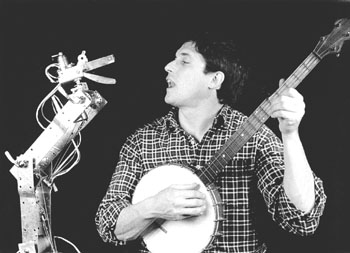![[Metroactive Stage]](/gifs/stage468.gif)
[ Stage Index | North Bay | Metroactive Home | Archives ]
She, Robot
Performance artist Tom Sgouros ponders the nature of a robot's brain and lets the kitchen sink do the talking
By Sara Bir
What does a robot think about being turned off for days at a time or the drudgery of doing the dishes? Better yet, does a robot think at all? What is its version of consciousness?
Performance artist Tom Sgouros figured the best way to get to the bottom of such ponderous issues was to ask a robot. So he built one, named her Judy, and wrote Judy, or What Is It Like to Be a Robot?, a semisolo show that explores free will, consciousness, and the interaction between the maker and the made with insight, charm, and a few magic tricks.
Sgouros, whose home base is in Providence, R.I., has taken Judy on the road for a tour of California universities, making a Nov. 1 appearance at Sonoma State University.
Much of Sgouros' creative output--he's done six other one-man shows--has dealt with such issues. "This is not actually the first show of its sort that I've done," he says, "but it's the first one that's used a robot. . . . Something about the robot makes it sort of gimmicky, and that makes it easy to tour it. People are curious, or maybe it makes it easy to understand what's going on."
Sgouros' interest in the philosophical consequences of artificial intelligence came far before dabbling in the technical aspects of robotics. "I wrote a show that required a robot, and you can't buy them, so I had to build one," he says. "It really went the other way around--the requirement drove the tinkering. You'll see that I'm not much of a tinkerer, either. It works, but it's pretty rough."
Judy eventually emerged from Sgouros' basement, an oddly adorable appendage composed of old computers, a couple of bicycles, a copy machine, and, for good measure, a kitchen sink. Judy has no arms, but she does have a jaw, which she is inclined to use without reservation, questioning Sgouros' seemingly logical statements. For a crude skeleton of copier parts, Judy has a lot of personality and self-awareness. It's not so much a show about a robot, but rather a fanciful, quasi monologue about the implications of being a robot.
"You can't say that one day I woke up and said, 'I'd like to make a show about cognitive psychology.' It didn't really work like that," Sgouros says. "I remember thinking that it would be interesting to have a discussion with a computer. When I talk to you, I can assume there's a vast amount of things we can share. You know what it's like to be angry, you know what it's like to be hungry, you know what it's like to be embarrassed by a bad haircut. But maybe if we had an intelligent machine, we still wouldn't be able to talk to it. Where would be the disconnects?"
The resulting show amounts to a human-and-robot "Who's on First?" scenario. Says Sgouros, "At one point in the show I say I have a chess set where the black pieces are red, and Judy goes, 'What?! What do you mean the black pieces are red--they're red!' Then we start talking about all the other things that are black that aren't really black: black eyes, black clouds, the Black Sea. . . . So the computer has to reassess it's conception of what black means--without a lot of helpful guidance from me, I admit."
Sgouros, through Judy, makes philosophy accessible with a very dry wit. Seemingly endless philosophical loopholes dealing with consciousness are much easier pills to swallow once a roughly hewn robot who belts out renditions of "John Henry" transforms them to fruity Flintstones chewable vitamins.
[ North Bay | Metroactive Central | Archives ]
Copyright © Metro Publishing Inc. Maintained by Boulevards New Media.
![]()

Man's Best Friend: Tom Sgouros thinks through the nature of thought with Judy's help.
Tom Sgouros will perform with Judy the Robot at the Sonoma State Cooperage on Friday, Nov. 1 at 9pm. Sonoma State University, 1801 E. Cotati Ave., Rohnert Park. $5 general; free for SSU students with ID. 707.664.2382.
From the October 31-November 6, 2002 issue of the North Bay Bohemian.